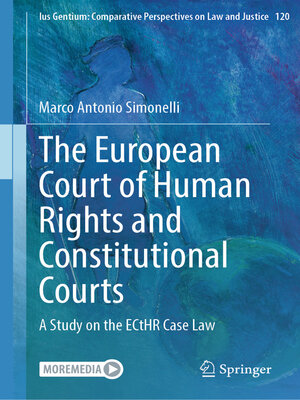The European Court of Human Rights and Constitutional Courts
ebook ∣ A Study on the ECtHR Case Law · Ius Gentium: Comparative Perspectives on Law and Justice
By Marco Antonio Simonelli

Sign up to save your library
With an OverDrive account, you can save your favorite libraries for at-a-glance information about availability. Find out more about OverDrive accounts.
Find this title in Libby, the library reading app by OverDrive.



Search for a digital library with this title
Title found at these libraries:
| Library Name | Distance |
|---|---|
| Loading... |
This book investigates the relationship between the European Court of Human Rights (ECtHR) and national constitutional courts by providing a more general assessment as seen from the former's perspective. Adopting an empirical approach, the book reviews all the case law of the ECtHR in which constitutional courts are cited. This represents more than 3,000 rulings spanning more than fifty years, from the establishment of the Strasbourg Court in 1959 – when only three constitutional courts were active – to 1 January 2023, when there were more than thirty active constitutional courts in the Council of Europe's Member States.
This wide-ranging empirical study pursue several different goals. First, the book provides a quantitative assessment of the relevance of constitutional courts in ECtHR case law and presents weighted data on the frequency and chronological evolution of the citations, as well as individual statistics for each national constitutional court. Second, it assesses the extent of the rationalisation of constitutional justice systems conducted by the Strasbourg Court and defines the standards and elements of the right to a fair constitutional trial under Article 6 ECHR. Finally, combining this extensive dataset with qualitative analysis, the book evaluates how the Strasbourg Court interacts with each constitutional jurisdiction and provides a qualitative assessment of this relationship from the standpoint of Strasbourg case law.







